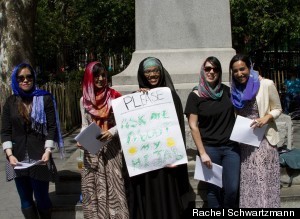In the spirit of Mother's Day and all that is empowering to women, I wanted to share a personal experience that very recently happened in my own backyard. We know and understand New York City as the land of opportunity and a city of diversity and cultural awareness, but even this dreamy concrete jungle has some flaws that need to be corrected and some stories that need to be heard.
So this may seem like an obvious statement, but I'm asking you to really stop and think about it. It's a beautiful spring afternoon. You're with your friends strolling through the park in your downtown district, and aside from the usual town locals, you are aware of the fact that there the usual and expected street performers and activists, but unaware of why they are trying to get your attention and what they are really trying to say. For some reason, one of these groups seems to catch your attention and for a split second in time, you listen to them and start to think about something beyond yourself and your needs.
In this day and age, we are almost programmed to continuously go without stopping, even if there is a good reason to. And furthering this, when we want something, we want it instantly -- we don't let anything or anyone get in the way. I can personally testify to this, as the hypothetical situation I gave above was indeed my Saturday afternoon. I was doing the usual fashion blogger routine, taking photos with a friend and finally enjoying the nice weather. I came across a group of young women who I made eye contact with. They gave me a flyer, and I politely mumbled "thank you" and continued walking. I briefly looked down at the piece of paper they had given me and stopped in my tracks as I read what they had written:
A woman's choice in clothing is her own.
Her choice may be a statement, but the meaning of a woman's clothing is uncertain until you ask her.
It cannot be assumed that she has been forced to wear her outfit. If she has, the problem lies not in the clothing, but in the mentality behind the hands that force her to put it on.
To point to the clothing of a woman as an incontestable sign of the state of her freedom is a mistake.
To point to the clothing of a woman who as unspoken invitation to violence is a crime.
Some of us find freedom in being naked.
Some of us find freedom in being covered.
Everyone can find freedom in deciding what to wear.
No one deserves either judgment or punishment for what they are wearing.
I remained quiet and awe-stricken at the powerful and extremely relevant message that was resting in my hands. By this point, I had already walked a good distance away from the group of women, but I wanted to know more. I quickly re-approached the group and asked what had brought about this silent protest. They explained to me that a recent story in the news in which a woman of their culture -- an expecting mother, no less -- was beaten to death due to the fact that she was wearing a hijab. The culprits had dared to pass judgement on this woman, calling her a terrorist because of the preconceived cultural notions we associate with this type of dress. It was baffling to hear a story like this being told directly to me, and making eye contact with a group of people who were deeply affected, rather than just half-listening to it on the news. At that point I didn't know the appropriate thing to say, other than good luck. I then asked for a photo of the girls (pictured below).
This encounter stayed in my mind for the remainder of the day. As a fashion blogger and writer, I produce content about the fantasy and frivolity that derives from fashion and personal style -- I blog about beauty and the expression associated with it. But up until this point I had never stopped to consider that social dress goes far beyond self-expression. Whether we choose to accept it or not, for some, fashion is a matter of social and cultural acceptance. If we choose to break these dress codes, the consequences, as seen in this article, can sometimes be horrific. This is a social flaw and this is something that I alone cannot fix. But from this experience, I now know that fashion has a much bigger influence, both negative and positive, in society than people sometimes like to admit.
I'm not sure if I will see these five women again, and it's a little disheartening that I can't get in touch with them, but I guess I have myself to blame. I didn't ask for their names, I didn't ask for their contact information and I didn't re-approach them thinking that this would make for a good blog post or article. Instinctively I knew that this was a story that needed to be heard... But they did ask something of me, and I obliged. They asked me to ask about their hijab, and I am extremely grateful that I did.
